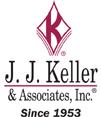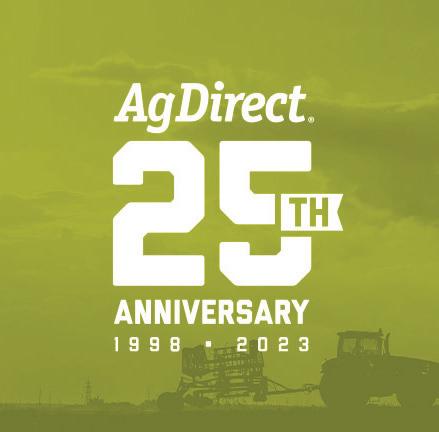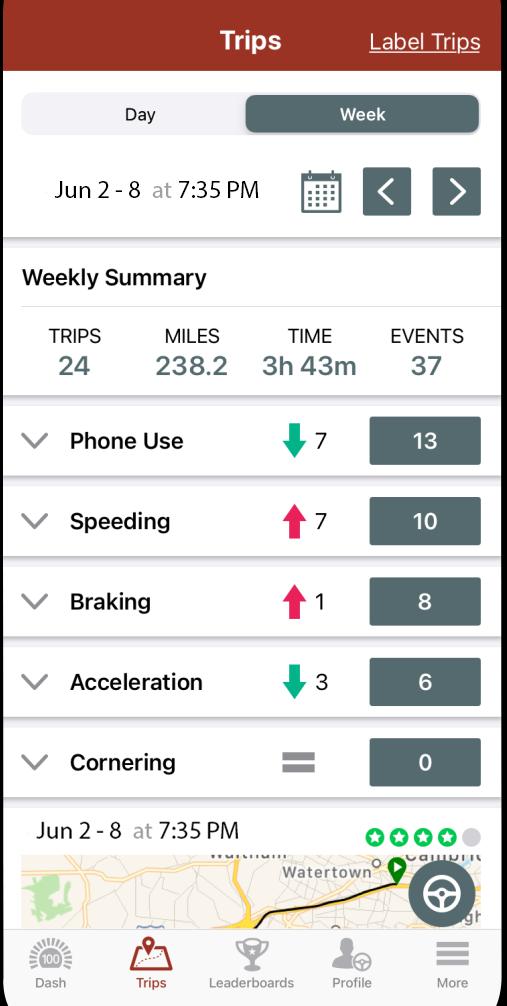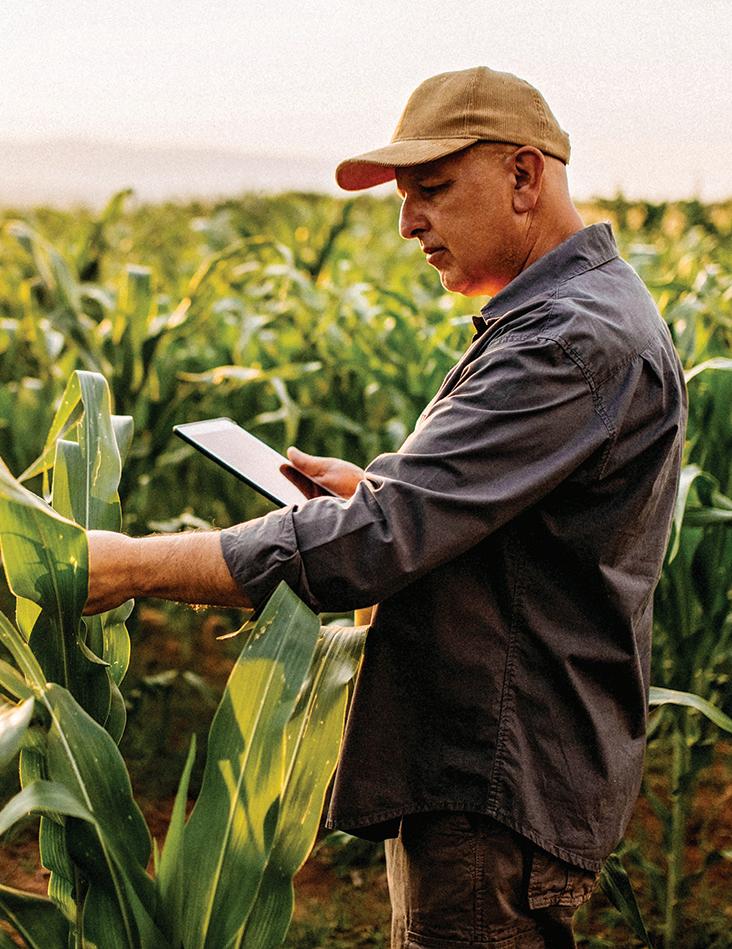the Retailer
SERVING AG, CONSTRUCTION AND OUTDOOR POWER EQUIPMENT DEALERS ACROSS IOWA AND NEBRASKA
SUSTAINABILITY
Sustainability is not just about preserving the planet, but also ensuring the well-being of your business for years to come.

Q2: 2023 | Quarterly magazine


























AN ASSOCIATION MEMBER BENEFIT FOR 119 YEARS DIRECT, LOCAL MARKETING REPRESENTATIVES AUTO PROPERTY AND CASUALTY SELF-INSURED RETENTION POLICYHOLDER SURPLUS LIVE VOICE CUSTOMER SERVICE TAILORED, INDUSTRY-SPECIFIC COVERAGE BUSINESS SUCCESSION AND ESTATE PLANNING STABLE FACE-TO-FACE RELATIONSHIPS FINANCIAL STRENGTH MUTUAL COMPANY DIRECT CLAIMS REPRESENTATIVES 500+ EXCLUSIVE ASSOCIATION RECOMMENDATIONS ESTATE PLANNING ATTORNEY NETWORK ANNUITIES CERTIFICATE CENTER SURETY SPECIALISTS MANAGED CARE CYBER MYSHIELD® IT’S OUR BUSINESS TO PROTECT Safety Training Resources and HR Support at Your Fingertips Commercial Insurance Property & Casualty | Life & Disability Income | Workers Compensation | Business Succession and Estate Planning | Bonding Federated Mutual Insurance Company and its subsidiaries** | federatedinsurance.com 23.02 Ed. 1/23 *View A.M. Best Rating Guide information at www.ambest.com. **Not licensed in all states. © 2022 Federated Mutual Insurance Company Access industry-specific training, sample forms and policies, an employee handbook builder tool, and more 24/7 with mySHIELD®. Scan to learn more about mySHIELD®. The content of this publication is for general information purposes only. Consult with a qualified professional when you have detailed questions regarding any topic in this publication.
CONTENTS
4
EXECUTIVE INSIGHT
Involvement in your local community is vital to your dealership’s success. As small, rural Midwest communities struggle with declining populations, dealers are stepping up to support their neighbors and local programs.

3 16
FEATURE DEALERS IN THE NEWS
Equipment dealers are making waves in the news with their accomplishments. What have your fellow dealer members been up to?
FEATURE SUSTAINABLE FARMING
Sustainability is becoming an influential movement in agriculture, and ignoring its implications might be bad for your business. Expo Director Tom Junge analyzes the latest sustainability trends and how they could affect your dealership.


NEBRASKA FIELD REPORT
Adapting to changing environments is an essential component of sustainability. It is about making wise decisions built upon the principles of innovation, endurance, and profitability. Director of Dealer and Government Relations Phil Erdman dives more into business sustainability.

FEATURE AGDIRECT
Since 1998, AgDirect has been serving customers and dealers using a point-of-purchase model that has become one of the fastest growing equipment financing programs in the nation.

FEATURE WORKPLACE SUSTAINABILITY
Being more sustainable in the workplace is not only good for the environment, but it can also improve the well-being of employees and reduce costs for businesses. Learn more about the numerous benefits to being more sustainable in the workplace.

TABLE OF CONTENTS | 1
10 20
6
CONTENTS
OFFICERS:
Jay Funke Chairman, Edgewood, IA
Kevin Clark Vice Chairman, Lincoln, NE
Tim Kayton Past Chairman, Albion, NE
DIRECTORS:
Ivan Dorhout Rock Valley, IA
Kent Grosshans Central City, NE
Brian Koonce Ankeny, IA
Dave McCarthy Waterloo, NE
Mark Placek Alliance, NE
Matt Vande Hoef Hull, IA
STAFF:
David Adelman IA Legislative Director
Gretchen Burch Admin. Svcs. Assist.
Phil Erdman Dir. of Dealer & Gov’t Rel.
Cindy Feldman
FEATURE CAPTIVE INSURANCE PROGRAM
Outside of the traditional health insurance carrier options, what solutions exist to try and control one of the highest expenses your organization faces? Captive insurance could be exactly what you’re looking for.

MARKETING VIEW
The new year is well underway, and you’re going to want to capture those memories with your smartphone. Here are five tips for making better videos from your phone—whether you’re doing it for work or for fun.

Marketing Director
Mark Hennessey President/CEO
Tom Junge Expo Director
Tim Keigher NE Legislative Director
Donna Miller Operations Manager
Gwen Parks Controller
Channon Timm Admin. Svcs. Assist.
Sydney Upah Marketing Comm. Designer
CONTACT INEDA:
8330 NW 54th Ave. Johnston, IA | 50131-2841
E: info@ineda.com | W: www.ineda.com P: 515.223.5119 | F: 515.223.7832

TF: 800.622.0016.
SUBSCRIPTION INFORMATION:
Individual subscriptions are available without charge to Association members. One-year subscriptions are available to all others for $30.00 (4 issues). Contact INEDA for additional information. This publication is designed to provide accurate and authoritative information in regard to the subject matter covered. It is furnished with the understanding that the Iowa-Nebraska Equipment Dealers Association, the publisher, is not engaged in rendering legal, accounting, or other professional services. Changes in the law may render the information contained in this publication invalid. Legal advice or other expert assistance should be obtained from a competent professional.
2 | TABLE OF CONTENTS
24 26
Vol. 112 No. 2
The theme of this issue of the Retailer is sustainability. It’s an interesting term that seems to face constant challenges. The literal definition of the word from a business context is “the ability to maintain or support a process continuously over time.”
How do you sustain something when change continually rears its head?
• The world is changing—climate change is playing a significant role in sustainability of the earth. How will these changes affect agriculture practices?
• The customer dynamic is changing—larger farming operations, an increase in corporate farms, more multi-state operations, and fewer smaller farms. These factors affect sustainability of multi-generational relationships.

• Social behaviors and human interaction are changing—social media is a huge influence on society. The perception of your dealership and your brand can be shaped by social influencers. This affects the sustainability of your business should negative content arise.
I doubt that very many dealers—if any—are maintaining the same processes, using the same systems, or offering the same products to the same customers that they did 10 years ago.
In order for businesses to be sustainable, we can’t get caught up in our old ways or incorrectly believe that societal changes won’t affect us. New factors are constantly challenging us, pushing us out of our safety zones, and requiring us to take more risks, respond quicker, innovate faster, and overcome obstacles by implementing new practices.
We need to incorporate the element of change when we talk about sustainability in order to achieve ongoing success. Sustainable change is defined as “a permanent change that meets the needs of the present without impeding future generations to meet their own needs.” While sustainability is a goal that businesses should strive for, sustainable change is the process of making sustainable improvements that will last the test of time.
The Iowa Nebraska Equipment Dealers Association (INEDA) gives a platform for many of the leading companies in agriculture sustainability to showcase their new technology and innovative products, which are reshaping the future of agriculture. Products such as autonomous equipment, electrification, precision planting, and drones are a sampling of what is to come in our future. Specifically, the Nebraska Ag Expo dedicates a huge footprint of space to introduce these products to growers and producers. Many of these same companies also exhibit at the Iowa Ag Expo, which are both owned and managed by INEDA.
Are these products threats or opportunities? Are they sustainable with a viable future or not? How will these new innovations affect your dealership? What can you learn from them, or how can you implement them in your own dealership operations? Do you want to be an early adopter or take a conservative approach?
These questions are ready for you to explore as you determine the direction of your dealership’s future. I encourage you to attend both of our shows and talk to these innovators as you chart your future. INEDA is giving you a front row seat to these new products and technology that will help your dealership be sustainable over time. At these shows, you will see things that others dealers throughout the country won’t have an opportunity to experience. As a representative of your association, I encourage you to take advantage of new ideas that can position you for many years of success.
I look forward to seeing you 10 years from now…
Chief Executive Officer

executive insight EXECUTIVE INSIGHT | 3
AKRS Equipment hosted its new Ag and Turf Expos in February and March at Fonner Park in Grand Island and the Lancaster Event Center in Lincoln, respectively. The event showcases the most extensive line-up of John Deere equipment in Nebraska.

Merz Farm Equipment celebrated its 70th anniversary with a celebration dinner on Thursday, March 9 with overwhelming support and attendance from the community. Merz Farm Equipment plans to build a new 100’x160’ shop to accommodate the Fendt contract and lines of equipment.


4 | FEATURE DEALERS IN THE NEWS
Owen Palm, president and CEO of 21st Century Equipment, received the Scottsbluff/Gering United Chamber of Commerce’s most prestigious award, the Trail Blazer of the Year Award. The award recognizes an individual who gives their talents and resources to the community in such a way that the entire community reaps the benefits.
MAKING HEADLINES
The equipment dealers in Iowa and Nebraska that make up the Iowa Nebraska Equipment Dealers Association (INEDA) are making waves in the news with their accomplishments.
Owen Palm, president and CEO of 21st Century Equipment, received a standing ovation from the audience after he was selected for the Scottsbluff/ Gering United Chamber of Commerce’s most prestigious award, the Trail Blazer of the Year Award, on Wednesday, January 25. Palm told the crowd that he was left speechless in receiving the honor.

Merz Farm Equipment, located in Falls City, Nebraska, celebrated its 70th anniversary with the community on Thursday, March 9. The family-owned dealership has been serving its customers since 1953. The anniversary celebration dinner was standing room only!
AKRS Equipment debuted its new Ag and Turf Expo to highlight the most extensive lineup of John Deere equipment in Nebraska and allow folks to visit with product specialists. AKRS partnered with UNL Cooperative Extension to provide continuing education credits with workshops on soil health and cover crops,
Hull, Nebraska is the new home to a large
dealership, Van’s Power Center, co-owned by Matt Vande Hoef of Van’s Implement.
nitrogen management, farm succession planning, irrigation management, and weed/pest management.
Matt Vande Hoef of Van’s Implement recently opened a new powersports dealership, Van’s Power Center, as co-owner. Van’s Power Center, formerly called Glen’s Sports Center and located in Sheldon, is located at 517 Brown St. in Hull.
Want your dealership’s news to be featured in the Retailer magazine? Email us at sydneyu@ineda.com or call 515.223.5119!

FEATURE DEALERS IN THE NEWS | 5
powersports

6 | FEATURE SUSTAINABLE FARMING
ou can hardly visit an agricultural company website without reading about their role in sustainable agriculture.
John Deere’s website states, “John Deere’s strategic commitment to sustainable practices delivered better outcomes for customers and communities. Like developing battery-electric backhoes that eliminate tailpipe emissions. A more intelligent sprayer that reduces herbicide use, which could save farmers money and time.”
The University of California Sustainable Agriculture Research and Education Program says, “Sustainability rests on the principle that we must meet the needs of the present without compromising the ability of future generations to meet their own needs. Therefore, stewardship of both natural and human resources is of prime importance.”
Carbon farming is a type of sustainable agriculture. According to Agoro Carbon Alliance, who attended both the Iowa Ag Expo and Nebraska Ag Expo, carbon farming practices include three components:

• Nitrogen Efficiency: Strategically manage how and when you apply nitrogen to increase efficiency and yield potential.
• Tillage: Reduce or eliminate tillage to keep carbon in your fields and cut down costs.
• Cover Crops: Cover crops improve soil health and help keep carbon “locked in the soil.”
Indigo Ag and Summit Carbon Solutions are two other companies that attended the Iowa Ag Expo and Nebraska Ag Expo this year to promote carbon
sequestration practices. None of these carbon sequestration companies attended the shows three years ago; that tells you how new these practices are.
SUSTAINABLE AG PRACTICES COMING TO A FARM NEAR YOU Y
In February, I attended the World Ag Expo in Tulare, CA. Sustainable agriculture was at the forefront of many conversations that I had during my visit. Part of the reason for the popularity of this topic is due to the severe drought in the area. The 2014 Sustainable Groundwater Management Act requires groundwater sustainability plans to avoid overdraft of water within 20 years. The other reason is the consumer. According to the exhibitors I talked with, sustainability is a regular talking point in their conversations with growers and retailers. They all agree that consumers are driving the sustainability movement, and they noted that it is very prevalent in the wine grapes industry already.
At the World Ag Expo, there was nearly a full tent of exhibitors with technology for monitoring and automating irrigation. New probes and sensors are being developed to determine precisely when irrigation is needed. There are even probes being tested that will isolate the ions in the soil. AquaSpy has a nitrate (NO3) sensor that has gone through several months of alpha testing in the lab and some handheld field trials. Developing a nitrate sensor that works will ultimately allow producers to increase the efficiency of their nitrogen application. Probes are also being developed for potassium and phosphorus.
A few other companies at the World Ag Expo— Mantis Ag Technology, John Deere, and Greeneye Technology—were offering ways to cut or eliminate chemical use, such as smart spraying using artificial
FEATURE SUSTAINABLE FARMING | 7
TOM JUNGE Expo Director [tomj@ineda.com]
intelligence (AI). OnTarget Spray Systems claims that by positively charging their spray, micro particles will cling to negatively charged plants, thus reducing chemical and nitrogen application by 80 percent. Cultivating crops using AI technology was also demonstrated by Farmwise, Stout Ag, Nexus Robotics, and Naio Technologies at the World Ag Expo. Some exhibitors feel that government regulations will ultimately change farming practices. Water quality issues in rivers and lakes are being left unresolved with current volunteer methods. The Des Moines River and Raccoon River in Iowa are prime examples. Nitrogen usage and tillage practices will be targeted. Strip-till and no-till will become more prevalent. Tillage companies are recognizing this movement, as more of these companies are appearing at farm shows showing newly-developed strip-till components.
Drones have also entered the conversation to help producers save not only on labor, but also on water. The Association for Unmanned Vehicle Systems International estimates that farms will eventually account for an 80 percent share of the commercial drone market, because farming by drone instead of tractor can successfully reduce water and fuel needs, cut costs, and improve crop yields.
Hylio is launching the largest commercial spray drone available to farmers today.
“With an 18-gallon capacity and up to 40-foot swath width, the AG-272 can cover up to 50 acres/hour at a 2 GPA application rate,” said Hylio Co-Founder and CEO Arthur Erickson. “Drones are more flexible tools than tractors in that they don’t need to traverse graded terrain and slopes and can get the job done no matter the conditions.”
Drones are also using special cameras to capture images that allow researchers to quantify how much water and chlorophyll is in the plants, which allows for 3D measurements of plants in different parts of the field.
Sustainability is also the driving reason for the development of new cover crop seeding methods. A couple companies are working on individual row “autonomous robots” to seed cover crops in standing corn. Another company, Aeroseeder LLC, is reversing the development of their seeder. Instead of adapting a seeder to a drone, he is beginning with a seeder and making it a drone.
You might be thinking: This is what’s happening in California, not the Midwest, so it’s not relevant to me. True—to an extent. It seems that anything that happens in California eventually makes it to the rest of the country.
I will leave you with two questions to consider. How can your dealership play a role in the sustainability movement? Are you being proactive, or are you waiting on your major manufacturer to provide new tools for sustainability? Sustainable agriculture practices have the potential to negatively impact your tillage, fertilizer applicator, and sprayer sales unless you are prepared.
8 | FEATURE SUSTAINABLE FARMING











Help Your Employees Make it Home Safe Today Federated DriveSAFESM Telematics helps your employees improve their daily driving habits and return home safe at the end of the day. Commercial Insurance Property & Casualty | Life & Disability Income Workers Compensation | Business Succession and Estate Planning | Bonding Federated Mutual Insurance Company and its subsidiaries** | federatedinsurance.com 23.01 Ed. 1/23 *View A.M. Best Rating Guide information at www.ambest.com. **Not licensed in all states. © 2022 Federated Mutual Insurance Company Please Make It Home Safe Today. Scan to learn more about DriveSAFE TELEMATICS The content of this publication is for general information purposes only. Consult with a qualified professional when you have detailed questions regarding any topic in this publication. AN ASSOCIATION MEMBER BENEFIT FOR 119 YEARS DIRECT, LOCAL MARKETING REPRESENTATIVES AUTO PROPERTY AND CASUALTY SELF-INSURED RETENTION POLICYHOLDER SURPLUS LIVE VOICE CUSTOMER SERVICE MYSHIELD® TAILORED, INDUSTRY-SPECIFIC COVERAGE BUSINESS SUCCESSION AND ESTATE PLANNING STABLE FACE-TO-FACE RELATIONSHIPS FINANCIAL STRENGTH MUTUAL COMPANY DIRECT CLAIMS REPRESENTATIVES 500+ EXCLUSIVE ASSOCIATION RECOMMENDATIONS ESTATE PLANNING ATTORNEY NETWORK ANNUITIES WE’RE BETTER TOGETHER LIFE AND DISABILITY INCOME PRIVATE BONUS PLANS KEY PERSON COVERAGE WORKERS COMPENSATION HIRING PRACTICES FEDERATED DRIVESAFESM TELEMATICS SOLUTION RISK MANAGEMENT RESOURCE CENTER EMPLOYMENT RELATED PRACTICES LIABILITY EMPLOYMENT LAW ATTORNEY NETWORK BONDING EMPLOYEE SAFETY TRAINING RISK MANAGEMENT ACADEMY CLIENT CONTACT CENTER FIELD RISK CONSULTANTS CERTIFICATE CENTER SURETY SPECIALISTS MANAGED CARE CYBER IT’S OUR BUSINESS TO PROTECT ACCA MEMBERS FEDERATED DRIVESAFESM IT’S OUR BUSINESS TO PROTECT INEDA MEMBERS
SUSTAINABILITY ISN’T NEW
It’s a requirement to stay in business. Hopefully the headline didn’t bring to mind images of a former vice president or youthful advocates asking the rest of the world to dramatically change their lifestyle (while proceeding to maintain their own lavish standard of living).
Many times, their idea of “sustainability” feels more like a challenge or ultimatum. This article is not going to be like that at all. Quite the opposite.
Every day, it seems a new “sustainability expert” is trotted out (in the media and online) to convince you that what they are saying (or demanding) is essential for the future of all humanity. For me, I prefer to listen to those who have “been there and done that.” Folks who have not only rolled up their sleeves, but have dirt under their fingernails, too.
Please let me share my take and the components I think should be part of your dealership’s sustainability plan.
Profitability
Yep. There is no possible way that you can achieve the transformational goals absent the ability to stay in business and be rewarded for the time and effort you will invest. Through effort and expertise, you will make decisions that affect your customers, the future of your business, and the sustainability of both. There is no need for another generation of manager, customer, or even owner if the dollars and cents don’t work. At the same time, there are ways to be
PHIL ERDMAN Director of Dealer and Government Relations [phile@ineda.com]
both profitable and still meet societal expectations of sustainability.
To be clear, there is nothing wrong with being mindful of how the decisions we make can affect the natural resources we steward for the generations that follow. It just can’t be done in a vacuum without regard to the well-being of the people and communities who depend on your business’ success for their livelihood.
Endurance
According to the Harvard Business Review, “The art of endurance is increasingly rare. Over the last 50 years, the average lifespan of S&P 500 companies has shrunk from around 60 years to closer to 18 years.” They aren’t referring to companies who go through the common and sometimes necessary mergers and consolidations of businesses. Rather, they are pointing out the trend of companies who have failed to adapt to the needs of their customers and the relevancy of the products and solutions they offer.
Day in and day out, you seek to understand your customers and their needs. Attempting to navigate those expectations in a world with disrupted supply chains requires endurance. Customers remember who was there for them when they needed help and who cared for them for during those difficult times. Make sure that you recognize a very vital component of your sustainability plan—earning the respect and trust of your customers.
Innovation
Just as trendy today as your latest climate activist declaration is the term innovation. It isn’t a new
AROUND
10 | NEBRASKA FIELD REPORT
ne
NEBRASKA
term, but it is experiencing a resurgence. Bringing a new perspective to an old issue or challenge has been vital for the advancements we have benefitted from for generations.
Through our recent efforts with the Nebraska Ag Expo and Innovation Hub, we discovered countless companies who are grinding in the innovation space. These companies worked tirelessly to develop new solutions, and they are now seeking the right market to demonstrate the value of their product. They are looking for partners—possibly dealers—to take the next step.
Are you interested in opening a discussion with these emerging start-ups that may help you enhance your endurance and profitability? We see an immediate nexus between serving you as a member of the Iowa Nebraska Equipment Dealers Association (INEDA) and hosting these innovative new companies at the Nebraska Ag Expo and Iowa Ag Expo. A full list of the inagural Innovation Hub participants is available in the column to the right. If you are interested in beginning a relationship with any of these companies, please reach out to us at INEDA.
Adapting to changing environments is an essential component of sustainability. It is about making wise decisions built upon the principles of innovation, endurance, and profitability.
The inaugural Innovation Hub in 2022 showcased 51 exhibitors, including entrepreneurs, start-up companies, and major manufacturers:
• 701X, North Dakota
• AcreTrader, Arkansas
• Ag Leader Technology, Iowa
• Agoro Carbon Alliance, Florida

• Agri Spray Drones, Missouri
• American Edge Grain, North Dakota
• AMVAC Chemical, Nebraska
• Arva Intelligence, Texas
• Autonomous Pivot, Kansas
• BinMaster, Nebraska
• Chrysalabs, Quebec, Canada
• Corral Technologies, Nebraska
• CropScan Ag, Colorado
• CropX, California
• Faresin/Ranko Equipment, Iowa
• Farmwave, Georgia
• Field Pocket, Nebraska
• Grain Weevil, Nebraska
• Haber Technologies Inc., Iowa
• LeafTech, Indiana
• LocusAg Solutions, Ohio
• Metos USA, California
• Modern Ag Inc., Nebraska
• Naio Technology, France

• Pattern Ag, California
• Phinite, North Carolina
• Pivot Bio, Iowa
• Plains Technologies, Nebraska
• RcFarm, Alberta, Canada
• RealmFive Agriculture, Nebraska
• Rogo Ag/SmartCore, Indiana
• Sabanto, Inc., Illinois
• Salin 247, Iowa
• Sentinel Fertigation, Nebraska
• Soiltech Wireless, Idaho
• Sound Agriculture, California
• Stout Industrial Tech., California
• TreadSure, Nebraska
• Vermeer Corporation, Iowa

12 | IOWA FIELD REPORT AROUND IOWA ia WILL ROGERS Director of Dealer and Government Relations [willr@ineda.com] 9 THINGS TO CONSIDER WHEN YOU SELL YOUR DEALERSHIP

IOWA FIELD REPORT | 13
Over the years, I have received inquiries from our members asking for legal information and advice regarding selling their dealerships. Based on previous conversations
I’ve had with dealers—and my own personal experience—selling your business can seem nearly impossible. And if it’s a multi-generational, family-owned business, it can certainly be an emotional experience, too. Often enough, it may not be your choice to sell your business. A death in the family, someone becoming disabled, divorcing your spouse, or disagreeing or falling out with your business partner—any of these situations might result in the need to sell your dealership. Sometimes you just lose your love of the business, and you can no longer commit to what is needed to properly maintain the company. Other times, your manufacturers let you know that it is time for you to get out of the business.
Selling your dealership can be a rewarding experience. You can quit working 80 hours a week, spend more time with your family, travel, and try things that you have been putting off for years (like playing pickleball). Selling can also assure your financial future for retirement.
No matter what the reason, you ultimately want to make as sound of a business decision as possible, which includes cleanly transferring the dealership and maximizing the value of the sale. Here are some things to consider as you look at the possibility of selling your business:
1. Commit
If you’re going to sell your business, then sell it. Don’t get all the way to the last minute of the process and back out because you get cold feet. If you and the buyer have been fair with the negotiations, then follow through. If you end up regretting your decision, it’s better to do so with money in your bank account.
2. Lawyers
Pay for good legal advice. Even if you are selling to the most beloved member of your family, make sure you have separate legal representation. Make sure that you have an attorney that understands
business law, including mergers and acquisitions. You may have to look beyond your town or county to find a qualified attorney. Working with an out-oftown attorney may be necessary when it comes to potential conflicts of interest.
3. Business Appraisal
Hire a certified business valuation professional, and make sure they understand the complexity of a dealership. The land, buildings, and inventory can be calculated quickly. Determining the reputation and blue-sky value can be much more challenging. Be realistic when it comes to the value of your business. Just because you decided to sell doesn’t mean you won the lottery. Don’t let your emotions for your business price you out of the market.
4. Negotiations
Always understand that unless you have multiple buyers vying to purchase your business, you will likely have to give up something to get the deal done. Be clear from the beginning with any prospective buyers what your non-negotiables are. Don’t be afraid to walk away from the deal, but don’t go out of your way to sabotage it either. And if the market conditions aren’t favorable, then sometimes you’ll need to lower your expectations.
5. Marketing
When you decide that it is time to sell your dealership, you may not just want to stick a “for sale” sign in front of the business. You may want to consider listing your sale with a business broker who acts as a matchmaker for buyers and sellers. In addition to helping identify buyers, they can keep the identity of your business secret while advertising it in the marketplace, interview potential buyers, help with due diligence process of both parties, and help put together a buy-sell agreement.
6. Buyers
Don’t make the mistake of assuming that it will be another dealer that will buy your business. Depending on your dealership brand, location, size, sales, and financial position, you may not have a lot of interest from other dealers. A friend of mine has purchased several businesses over the past 10 years, including household rental stores, used car dealerships, and even a restaurant. Private equity
14 | FEATURE DIRECT PRIMARY CARE
“No matter what the reason, you ultimately want to make as sound of a business decision as possible.”
firms are always looking to find ways to diversify and create new investment opportunities in agriculture.
7. Confidentiality
Understand that secrets have a way of not staying secret. In small town Iowa or Nebraska, word of the potential sale of your dealership can get out quickly, which can have an impact on your family, employees, customers, competitors, and prospective buyers. It’s hard to keep things quiet once rumors start making the rounds, and you will have to determine what you can share and with whom you can share it.
8. Due Diligence
Once you sign a letter of intent with a buyer, you will begin the due diligence process. During this process, you will be required to disclose literally everything about your business to the buyer. That’s why I suggest that even if you are starting to think about selling your business 3-5 years from now, it’s a good time to start getting all the financial information regarding your business together. The process might result in you improving your business operations, increasing your profitability, cutting expenses, cleaning up your inventory, and paying some taxes.
9. Timing
Sometimes you go looking for a buyer, and other times the buyers come to you. Don’t let a good opportunity pass you by and lose out on the opportunity to sell your business. I have seen several dealers wait until it was too late and missed out on the perfect time to sell.
Finally, even if you aren’t in need of a business evaluation regarding a sale, it might be good practice to conduct one every five years to make sure that you are properly insured. If you need additional information or recommendations regarding the sale of your business, please contact the Iowa Nebraska Equipment Dealers Association (INEDA) at 515.223.5119 or inea@ineda.com.

FEATURE DIRECT PRIMARY CARE | 15

6 | FEATURE DYTI GRANT WINNERS
CELEBRATES
FAST,
FINANCING
Agriculture,
AGDIRECT
25 YEARS OF SIMPLE,
AND FLEXIBLE
Built for
Powered by Farm Credit
Since 1998, AgDirect has been serving customers and dealers using a point-of-purchase model that has become one of the fastest growing equipment financing programs in the nation.
Prior to AgDirect, the Farm Credit System did not have a consistent market presence in the machinery and equipment financing space.
As a mission-driven lender, Farm Credit Services of America (FCSAmerica) saw a significant opportunity to provide solutions and value to customers by improving the equipment financing user experience through accelerated transactions and personalized service.
Fast forward 25 years and the foundations of that vision would not only form one of the best collaborations within the Farm Credit System, but a trusted ag equipment financing partner that consistently ranks in the top three equipment lenders based on market share.
“AgDirect is the only equipment financing option among the top three that doesn’t manufacture equipment,” said Brian Legried, senior vice president for AgDirect. “What makes our approach so unique is that we are focused on developing longterm dealer relationships to establish their trust as a financial partner rather than on the color of the equipment being sold.”
“We are continuously working to understand the needs of our customers and provide creative financing solutions,” he added. “Plus, as an equipment financing program offered by participating associations of the 100-plus-yearold Farm Credit System, customers can count on AgDirect to be one of the most dependable lenders. Along with offering the most ag-friendly terms in the business, we offer exceptional financial strength.”
Better Customer Experience
Today, AgDirect is offered by 15 participating Farm Credit System associations and its portfolio reaches well above $5 billion. The nationwide equipment financing program serves as a competitive alternative for producers looking to purchase, lease or refinance new or used farm equipment at the dealership, at auction—both in person and online—and through private party transactions.
Before AgDirect, the loan application and credit approval process required customers to visit their lending office, fill out a loan application, and then drive to the equipment dealer to make their purchase.
The AgDirect model not only scaled back the length of the application, but it also accelerated credit decisions. Suddenly, customers could complete their loan application and have a credit response within minutes. At the dealership, 75 percent of AgDirect’s credit decisions are made in less than 30 seconds, allowing customers to count on quicker closing and funding for their equipment needs.
In 2010, other Farm Credit System Institutions outside of FCSAmerica’s four-state market started offering AgDirect financing in their markets contributing to AgDirect’s continued growth and success. Since then, producers across the country have benefited from the attractive rates, flexible terms and responsive service AgDirect delivers.
Investing in Technology
As AgDirect evolved, so did the technology used to support customers and dealers through the transaction process. Fax machines and overnight mail were replaced with online tools including a built-in payment calculator that allowed dealers to provide their customers with accurate pricing options and financing comparisons.
An online application, electronic signatures and mobile app were also added to improve ease of use and provide anytime access. Thanks to these tools, customers can now submit secure financing applications 24/7, sign documents remotely, and run different scenarios before making a purchase decision all from their mobile phone.
“As we look to the future, we’ll position AgDirect to continue doing what it has done for the last 25 years, and that is serving our dealers and customers while changing to meet marketplace needs,” Legried said. “One of the things I’m most proud of is the foresight Farm Credit had to invest in the technology that made the AgDirect platform what it is today.”
Legried said he is also proud of the people and partners who have worked together to share their agricultural expertise and a focus in equipment financing.
“AgDirect changed the industry, and there’s a lot of pride in the personalized service we offer. It’s been a win for the dealers, it’s been a win for customers and it’s been a success story for our program and the Farm Credit System Institutions offering it.”
Learn more about AgDirect equipment financing by locating your nearest AgDirect territory manager or contacting the AgDirect financing team at 888.525.9805.
FEATURE AGDIRECT | 17

IT’S ALL ABOUT THE STRATEGY We work together to create INNOVATIVE & STRATEGIC SOLUTIONS • Brand Development • Website Development • Digital Marketing • Social Media • Streaming • Content Creation • Video Production IN PARTNERSHIP WITH Ag We are your FULL SERVICE MARKETING CONSULTANT CONTACT A SALES REP FOR MORE DETAILS 800.888.1380 | JOHN.COSTELLO@LEE.NET
In 1928, the Iowa Power Farming Show (now known as the Iowa Ag Expo), owned and managed by the Iowa Nebraska Equipment Dealers Association (INEDA), was in its 18th year. Now it is over 110 years old, and INEDA is celebrating its 130th anniversary this year.





FEATURE THROWBACK | 17 Mergers & Acquisitions Business Law Succession Planning Wills, Trusts, & Probate 7155 Lake Drive, Suite 200 West Des Moines, IA 50266 www.KreamerLaw.com (515)727-0900 Samuel I. Kreamer, J.D., C.P.A. sikjdcpa@kreamerlaw.com 7155 Lake Drive, Suite 200 West Des Moines, IA 50266 Licensed in both Iowa and Nebraska INEDA Associate Member
THROWBACK PHOTO
SUSTAINABILITY IN THE WORKPLACE
 SYDNEY UPAH, Marketing Communications Designer [sydneyu@ineda.com]
SYDNEY UPAH, Marketing Communications Designer [sydneyu@ineda.com]
Agriculture is moving toward a more sustainable future. Advancements in technology like autonomous equipment, drones, precision agriculture, and artificial intelligence are transforming agriculture and, by extension, the equipment dealer industry.
Sustainable agriculture rests on the principle that we must meet the needs of the present without negatively impacting the ability of future generations to meet their own needs. Speaking of future generations—by the year 2050, we’ll need to feed two billion more people than we do right now.
As we race to develop better, faster, and smarter technology to ensure we can feed the growing
20 | FEATURE WORKPLACE SUSTAINABILITY
world, it often feels like we can’t move fast enough. How can we make the move toward sustainability in our daily lives while we make progress toward inventing, testing, and distributing innovative technology that will make agriculture more sustainable in the long-term?
Fortunately, there are many things that you can start doing right now in your dealership to conserve our planet’s resources and protect it for future generations. This is also known as workplace sustainability. Workplace sustainability is defined as “measuring organizational success according to triple bottom line criteria (people, planet,
profit), and acting individually and collectively to maximize effective use of natural resources and minimize negative impact on the planet.”
We all know how to reduce waste at home—recycling, returning bottles, using ceramic instead of paper plates and cloth rags instead of paper towels—but what about in the workplace? It may not seem like a worthwhile endeavor because it may not generate revenue in the traditional sense, but it may ultimately save your dealership money. Sustainability efforts can benefit your employees, too. Research shows that employees who engage in sustainability efforts at work also experience higher
levels of engagement in their jobs. Higher engagement leads to less burnout, higher job performance, and higher job satisfaction, which can mutually benefit both your employees and your organization.
Making the commitment to sustainability can also help your dealership better recruit employees. A recent survey published by Forbes found that 83 percent of millennials would be more loyal to a company that values sustainability and addresses environmental issues. There are many ways that you can be more environmentally friendly at work, and these simple changes can have a big impact over time.

FEATURE WORKPLACE SUSTAINABILITY | 21
“
“Being more sustainable in the workplace is not only good for the environment, but it can also improve the well-being of employees and reduce costs for businesses.”
One of the easiest ways to be more sustainable in the workplace is to reduce your energy consumption. This can be achieved by turning off lights and electronic devices when they are not in use, and by making use of natural light wherever possible. You can also reduce your energy consumption by using energy-efficient light bulbs and appliances.
Another way to be more sustainable in the workplace is to reduce your paper usage. This can be achieved by printing documents double-sided, using email instead of paper memos, and by reusing scrap paper for notes and drafts. If you do need to print documents, use recycled paper, and make sure to recycle any paper that you no longer need.
It is also important to consider the impact of your commute to work. If possible, consider walking, cycling, or using public transportation instead of driving to work. If you do need to drive, try carpooling with coworkers to reduce your carbon footprint. Still not convinced? There are numerous benefits to being more sustainable in the workplace, including:
Cost Savings
Sustainable practices can help reduce operational costs by conserving energy, reducing waste and lowering water usage. For example, turning off lights and equipment when not in use, using energy-efficient light bulbs, and reducing paper usage can save businesses money.
Increased Productivity
A sustainable workplace can improve employee health and
well-being, which in turn can lead to increased productivity. For instance, using natural light and air purifiers can improve air quality, reducing sick days and improving concentration.
Positive Brand Image
A sustainable workplace demonstrates a company’s commitment to corporate social responsibility, which can enhance its brand reputation and attract customers who value sustainability.
Compliance With Regulations
Being more sustainable can help businesses comply with environmental regulations and avoid fines for non-compliance.

Reduced Carbon Footprint
Sustainable practices can help reduce greenhouse gas emissions, which contribute to climate change. By reducing their carbon footprint, companies can help protect the environment for future generations.
Improved Stakeholder Relations
Sustainability can help build stronger relationships with stakeholders such as investors, customers, employees, and local communities. By demonstrating a commitment to sustainability, companies can improve their reputation and build trust with stakeholders.
22 | FEATURE WORKPLACE SUSTAINABILITY
Just as your dealerships and equipment manufacturers are developing new technology to ensure the sustainability of the agriculture industry for future generations, you too can apply these same principals within your offices. And these changes don’t have to be costly—in fact, they can even save you money! In conclusion, being more sustainable in the workplace is not only good for the environment, but it can also improve the well-being of employees and reduce costs for businesses.

By making small changes to our daily habits, we can all make a difference and create a more sustainable future.

FEATURE WORKPLACE SUSTAINABILITY | 23
Sustaining Health Insurance Amidst Rising Costs
 TY BURKE INEDA Benefit Advisor, The Accel Group [tburke@acceladvantage.com]
TY BURKE INEDA Benefit Advisor, The Accel Group [tburke@acceladvantage.com]
By definition, sustainability is the ability for someone or something to be maintained at a certain rate or level.
When you think about health insurance rates for your dealership, sustainability is most likely not top of mind. Health insurance premiums continue to rise, medical and prescription cost trends are not slowing, and the cost to provide benefits to your employees is no different.
Outside of the traditional health insurance carrier options, what solutions exist then to try and control one of the highest expenses your organization faces?
One concept to consider is the Iowa Nebraska Equipment Dealers Association (INEDA) Captive Insurance Program.
If you’re familiar with self-funded health care benefits, you already understand the advantages they offer. Self-funding is an attractive solution for health insurance benefits because it helps employers save on the cost of health care.
With self-funding, an employer avoids the fixed monthly premiums associated with a fully insured plan offered through a carrier, and instead assumes the responsibility and related financial risk for paying employees’ claims. With this comes a
certain amount of freedom. Self-funded plans allow for financial and administrative control, an advantage not offered when an insurance carrier has the reigns. Employers who choose to self-fund can realize cash flow advantages, as they only pay employee claims as they are incurred. The company can then invest and receive returns on unused claims funds (rather than the insurer). It also provides flexibility in plan design, as well as access to detailed reporting and claim insights.
Although self-funding is an attractive option, there are considerations to keep in mind.
One obvious question is: What happens if your dealership faces one or more catastrophic employee claims? This would be less of a concern with a fully insured plan, but self-funding requires the employer to cover the cost.
In a captive, stop loss insurance is the solution to help mitigate these concerns by putting a ceiling on financial risk. Employers can choose the stop loss coverage that works best for their needs. Specific stop loss protects a company against claims above a specified amount on a per-participant or per-family basis. Aggregated stop loss protects a company against accumulated claims that exceed a specified ceiling. The stop loss carrier is then responsible for any claims above this ceiling. This works well to protect groups against financial risk. However, for
24 | FEATURE CAPTIVE INSURANCE PROGRAM
small to midsize groups, self-funding may still feel like a gamble.
Why does a captive makes sense then?
For dealers considering self-funding but concerned about risk tolerance, captives provide a valuable stepping stone. Captives are essentially a pooled fund created by a group of employers that acts as its own insurance company. They allow the participants to spread financial risk between them and provide an added layer of funds for protection against high-dollar catastrophic claims that rise above the stop loss ceiling.
The pooled funds in a captive are available to every member of the captive; however, each individual company retains control of their individual employee benefits plan. The captive is owned by the groups who contribute to it, but managed by an independent outside vendor.
If the funds exceed claims, premiums can be refunded to the participant companies—they are not retained by an insurance company.
Advantages of a Captive
Why would a dealer consider joining a captive? Aside from offering small to midsize groups reduced financial risk to self-fund, they also provide several other advantages. They can help reduce and stabilize the fluctuation employers often see with year-over-year rate increases. They also offer more reporting and transparency when making health care decisions. With reduced risk comes the added benefit of a longterm strategy for financing employee health care benefits.
Who might consider a captive?
Any dealer interested in switching to a self-funded plan is a great candidate for a captive insurance arrangement. A captive provides a bridge to self-funding that helps groups avoid spikes in stop loss and the impact of catastrophic claims— financial situations that may currently be giving them concern.

Interested in learning more about captives?
The INEDA Healthcare Program team can help! To learn more about captives in partnership with INEDA, please contact us by phone at 877.463.3242 or by email at healthcare@ineda.com.
FEATURE CAPTIVE INSURANCE PROGRAM | 25
MARKETING VIEW
CINDY FELDMAN Marketing Director [cindyf@ineda.com]

MARKETING
Tips for Better Video From Your Phone
In today’s digital world, the power of video cannot be overstated. Whether you are creating content for work or social media, the quality of your video is crucial to capturing your audience’s attention and conveying your message effectively.
When it comes to work, creating high-quality videos can help you stand out from the competition. Whether you’re making a training video for employees or a promotional video for your dealership, the quality of your video can make a significant impact on the overall success of your efforts. Poor quality videos can undermine the credibility of your dealership business and cause viewers to lose interest, while high-quality videos can establish trust and capture the attention of potential customers.
Similarly, on social media, the importance of good quality videos cannot be overstated. With billions of people using social media every day, it’s more challenging than ever to stand out from the crowd. High-quality videos can help you capture the attention of your followers, and potentially even reach new audiences. The more people engage with your videos, the more likely they are to share them, increasing your reach and overall impact. But what makes a good quality video? Chris Snider, assistant professor in the School of Journalism and Mass Communication at Drake University in Des Moines and owner of Chris Snider Design, shares five tips for making better videos from your phone—whether you’re doing it for work or for fun.
1.
Clean Your Lens
Someone handed me their phone to take a photo recently. I looked at the screen and knew something was wrong. The lens was dirty. The easiest way to improve your videos may be simply wiping your camera lens clean.

2. Find the Light
Make sure the subject you are shooting has proper light. Find your main light source (usually a window) and stand between the light source and your subject. Shooting toward a window will likely make your subject too dark.
3. Shoot in Shots
Don’t feel like you need to shoot everything happening. Think about how you can get a shot that establishes what is going on, then show details of what is happening. And finally find a shot or two that will work to end your video.
4.
Get Reactions
Two things work well in video—action and reaction. Make sure you can see the faces of your subjects as they react to what is going on. I always get my kids socks for Christmas gifts, so I can see their reaction to that vs. what they really want.
5. Think About the Audio
A good video is only as good as the audio. Find ways to capture sound as well as sights of what is going on. Whatever you are shooting, do a quick brainstorm of the sounds associated with that event. Then plan how you can shoot video that includes those sounds.
26 | MARKETING VIEW

MARKETING VIEW | 27
WASHINGTON D.C. FLY-IN
The Iowa Nebraska Equipment Dealers Association (INEDA) and its members were honored to return to Washington D.C. on March 21-23 after a three year haitus due to the COVID-19 pandemic.

The Washington D.C. Fly-In plays a critical role in the success of INEDA’s legislative agenda and gives INEDA members the opportunity to discuss important topics with their representatives.

A dozen dealership executives, INEDA board members, and INEDA staff members attended the Washington D.C. Fly-In this year. They met with Congressmen Mike Flood, Don Bacon, Adrian Smith and US Senators Deb Fischer and Pete Ricketts from the Nebraska delegation as well as Representatives Mariannette Miller-Meeks, Ashley Hinson, Zach Nunn, Randy Feenstra and US Senators Charles “Chuck” Grassley and Joni Ernst from the Iowa delegation. The group also met with Glenn Thompson, Chair of the House Ag Committee, to discuss the 2023 Farm Bill.
The goal of the fly-in is to find common sense, results-oriented solutions to equipment dealer industry issues. INEDA presented six main issues to legislators during the fly-in:


Farm Bill
INEDA and its members advocated for a multi-year, fully-funded farm bill that addresses both ag economy and food security needs. In addition, INEDA requested that Congress uses this opportunity to help with the ever-increasing need for service and repair technicians for diesel engines.
Federal Rulemaking and WOTUS
The power of the bureaucratic rulemaking process continues to burden American businesses and farmers. INEDA requested that Congress exercises its power to curb rulemaking authority.
28 | FEATURE D.C. FLY-IN
Right to Repair
The American Farm Bureau Federation (AFBF) and several major equipment manufacturers signed Memorandums of Understanding to allow every farmer access to technical information, parts, tools, and diagnostic equipment to repair their own equipment. INEDA asked Congress to allow this process to continue to develop to better serve customers.


Infrastructure Spending
INEDA continued to advocate for federal support of infrastructure, including roads and bridges, and called for Congress to fully fund the Highway Trust Fund.
Tax Policy
Equipment dealers and their customers benefit greatly from tax cuts, including full expensing of new and used equipment purchases. INEDA sought for Congress to continue to support the current tax laws and reject any increased taxes on small businesses.
Pharmacy Benefit Manager Reform
The cost of healthcare and insurance continues to increase significantly. Prescription drugs are one of the main sources of this cost. INEDA asked that Congress pass legislation to create transparency, disclosure, and competition for PBMs.
At Tax Favored Benefits, we serve as a partner in helping individuals, families and business owners achieve financial success.
Our experienced professionals are supported by world-class resources in providing a full suite of wealth, investment and retirement planning services to clients across the country. We focus, first and foremost, on helping you achieve your personal financial goals.
As financial professionals, we put your best interests first, at all times and in all situations. We succeed when you succeed.

Interested in learning more about how we can help you achieve your financial goals? Contact us to get started. Custom Wealth Advice Driven By Your Needs We
forward to getting to know you. David B. Wentz, J.D., LUTCF | CEO Tax Favored Benefits, Inc. 4801 W. 110th Street, Suite 200 Overland Park, KS 66211 Phone: 913.648.5526 Fax: 913.648.6798 dbw@tfbusa.com
look
Representatives offer products and services using the following business names: Tax Favored Benefits – insurance and financial services | Ameritas Investment Company, LLC (AIC), Member FINRA/ SIPC – securities and investments | Ameritas Advisory Services (AAS) – investment advisory services. AIC and AAS are not affiliated with Tax
Favored Benefits.
FEATURE D.C. FLY-IN | 29
Celebrating 25 years of simple, fast and flexible financing.

Thank you for making AgDirect ® a leading equipment lender in the U.S.








Twenty-five years ago, AgDirect introduced a new brand of equipment financing that matched the demands of a changing agriculture – financing that truly understood the needs of those who buy equipment, and the business needs of those who sell it.
Today, with our easy applications, ag-friendly terms and responsive service, we continue to serve the ag equipment industry like no other lender.

Iowa-Nebraska
8330
54th
Presorted Std. U.S. Postage PAID Des Moines, IA Permit No. 762 CHANGE SERVICE REQUESTED
Equipment Dealers Association
NW
Ave. Johnston, IA 50131-2841
AgDirect is an equipment financing program offered by Farm Credit Services of America and other lenders, including participating Farm Credit System Institutions.




























































 SYDNEY UPAH, Marketing Communications Designer [sydneyu@ineda.com]
SYDNEY UPAH, Marketing Communications Designer [sydneyu@ineda.com]




 TY BURKE INEDA Benefit Advisor, The Accel Group [tburke@acceladvantage.com]
TY BURKE INEDA Benefit Advisor, The Accel Group [tburke@acceladvantage.com]




















